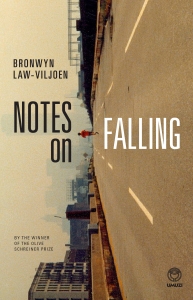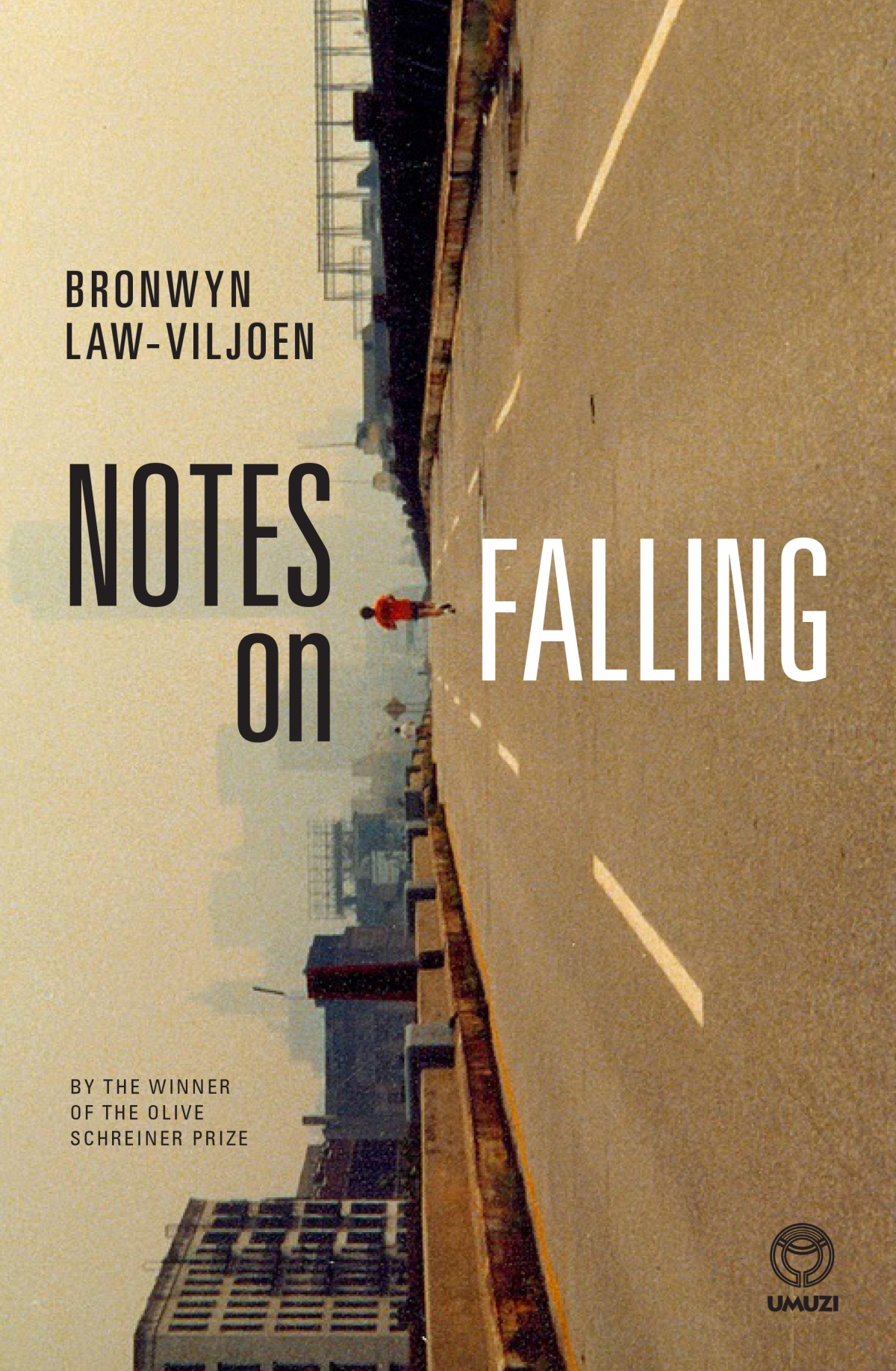
Notes on Falling is about the hope that art will challenge perceptions and orthodoxy so that the world can be reinvented through new forms. It is also about trying to reconcile the large pictures of history with the small snapshots of our individual lives.
“James took the movie camera out of its yellow box. ‘So the key is to make sure, after you’ve loaded, that the tongue of the film has caught the tooth in the gear.’ He snapped the hinged door on the side of the camera closed and fiddled with it for a few seconds, then he turned it towards her and started shooting, holding it to his eye with his right hand and his unlit cigarette aloft in his left.
Thalia reached over and took the cigarette from him and dropped it onto the table. She listened to the gentle stuttering of the camera and knew that she would use it for her project.
‘Here, you try.’ James gave it to her.
She felt the weight of the machine in her right hand, and she turned it and put the rubber cup to her eye. She started it and swung the camera slowly across the room, stopping at James who was grinning at her through the lens.
‘Okay, wait, I’ll be right back.’ She went to her room and fetched her latest prints. On the way back she stopped. The portfolio from Grahamstown was in the desk drawer and she went to take it out.
‘Finally,’ said James, sitting forward when she got back to the sofa.
‘This is where I started.’ She put the photographs from the portfolio down on the coffee table and spread them out. ‘I shot all of these in the Eastern Cape before I came here, and I haven’t done anything with them since then.’ She laid the print of Ainsley in the empty minibus in front of James. ‘This was the very first image, and in fact I never changed it. It always came first. I’m not sure why exactly, but it seems right in that position.’
James picked up the photograph and held it close to his face.
When he put it down again, Thalia placed the pictures in sequence across the table and onto the floor. ‘I’ve always thought that I should show them in a straight line, never in groups. And close together. Equal spacing, so that they’re quite tight, and connected to each other.’
When she was finished, James said, ‘Which are the ones you’re working on now? Put them after the last one over there, in the same way.’
Thalia took the new prints and laid them on the floor. James was on his feet now, following her across the mat.
She stood up and looked down at her photographs, realising, with a shock, that she’d been hunting for images in the last few months to echo the earlier ones. She’d been shooting in black-and-white, and had deliberately kept her camera away from the tempting street shots that she saw every day. Instead, she’d looked for slivers of things, pieces of information in the city that would add up to a picture.
‘Are you using a tripod here?’ James gestured at a shot she’d made of the stone wall outside the basilica on Mott.
She nodded. She had thought often about the energy in the streets around her, about how to get a quality into the image that would suggest this, though not technically, or literally. No blur, no running people. No smoke and mirrors, her father would have said. The tripod made her look carefully at what was going into the shot.
‘Well, it’s pretty obvious to me what’s happening here.’ James stabbed at the photographs. ‘This is all part of the same movie in your head. Look at this one here.’
He picked up a picture of a man she’d seen in Seward Park on the Lower East Side in July. He’d been doing tai chi in the early morning silence of the playground, and Thalia had set up the camera far enough away for him not to notice her presence. Only his raised right arm and the side of his face were visible, and just beyond him was a child’s swing hanging, dead still and empty, from a steel jungle gym.
‘I’m not sure that one should stay,’ she said, licking her lips nervously and reaching for the picture.
‘Well, if this one goes, then this one has to go too.’ James pointed at the shot of Ainsley. ‘Look at how you’ve composed these two photos, look at your angle. This one of the man is maybe more formal, but really they are doing the same thing.’
‘But isn’t it too much about form, isn’t it too abstract, all about patterns and stuff?’
‘Well, yes, maybe these two on their own, but they’re not on their own are they? What about this?’ He pointed to the alfalfa field, the bull visible in the far left corner as a dark shadow. The field was a grey square bounded by low trees and bushes. ‘This isn’t abstract, but it’s not a landscape either, not in the usual sense. It’s almost like you’re making a landscape while deliberately trying not to.’
‘Yes, that’s sort of it.’ Thalia picked up a shot of the ball field in Central Park, hoping he wouldn’t recognise it.
As if reading her thought, James said, ‘That looks familiar, but I don’t really need to know where it is because you’re not so hung up on place.’
‘Well that’s true, but also not true at all. It’s all about place. In fact, it’s like I’m looking for a place and I’m trying to get it into the pictures but not so that you can go, Oh that’s Central Park or that’s Prospect Park, or whatever.’
She pointed to a shot of the Astroturf at Port Elizabeth Tech, lit by floodlights and empty of people. It looked like a swimming pool except for the edge of a goal on the right side of the picture. ‘See, like that one. The place is actually very important, but how do I tell you that without telling you that? How do I make a space between what I know and your perception of the image? And what do I put inside that space? Do I put it in a caption? I hate captions.’
Thalia suddenly thought about Lesley and the roadhouse at Summerstrand, where they’d gone after she’d made that image.
‘I think you have to put it all together and see what’s needed first. Don’t assume you need to tell me something. That I won’t get it if you don’t tell me. But why don’t you make a film that fills in the gaps?’
“The German had not stirred from the seat where he was stretched out like a corpse, his left arm hanging to the floor.”
“Later Thalia lay on her bed and thought about how she’d made many of the Eastern Cape shots. Her driving job at the Leopard had been at the centre of most of them. She remembered the night she’d picked up the German geologist who’d flown in from Namibia where, to judge from his appearance, he hadn’t come in from the desert in a long time. He’d fallen asleep in the back row almost immediately, as she drove out of the airport parking lot.
She had been coming down the long hill towards the Paterson turn-off, just past the concrete table and chairs of a rest-stop under three blue gums, when a huge chunk of black something had loomed suddenly up out of the middle of her lane, too fast for her to swerve. She went straight over it before she could comprehend that it was a piece of rubber from a truck-tyre blow-out. As she struck it, she anticipated the metallic sound of the exhaust system hitting the tar and trailing sparks. She glanced at the rear-view mirror. There was nothing through the back window, and the German had not stirred from the seat where he was stretched out like a corpse, his left arm hanging to the floor.
At the Paterson road a few hundred metres further on, she turned in and sat for several minutes, breathing deeply and waiting for the trembling in her hands to subside.
Then she manoeuvred the minibus around and drove back up the hill. The geologist slept on, not moving as she pulled over onto the gravel shoulder and climbed out.
The night was so quiet and wet. She stood still for a moment, looking both ways, up the hill towards PE and north-east, towards Grahamstown. Then she dashed into the middle of the road, picked up the curved arm of rubber and a few smaller pieces scattered across the tarmac and carried them back to the verge. Looking over the barbed-wire fence into the veld, she half expected to see the overturned carcass of an interlink lying amongst the aloes and rocks, its remaining intact tyres spinning into the night sky. How had the driver not crashed? How had he negotiated the sudden slide of that giant body across the road surface?
She made the photograph there, standing in the headlights of the minibus and taking in the fence, a slice of rubber lying on the gravel shoulder, the road beyond. James had liked that shot.
What had made her go back and get out of the minibus on that deserted, night-time stretch of road to pick up the debris? Being a good citizen, her father would have said. She’d put the shredded rubber in the back of the Leopard, climbed in and u-turned towards Grahamstown.”
Extracted from Notes on Falling by Bronwyn Law-Viljoen, out now.
YOU MAY ALSO ENJOY
Extract: Second Verse by Onke Mazibuko









